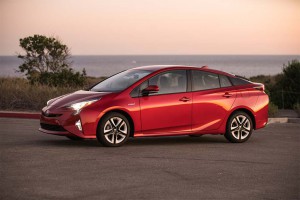
Toyota isn't to be producing any hybrids using a diesel engine any time the near term, an executive said.
Skepticism of diesel engines runs deep among carmakers and governments in East Asia, where the influential automakers in South Korea, Japan and China have avoided major investments in diesel power because of concerns about costs, pollution and public health.
Even European companies, such as Volkswagen AG and the French company PSA, have elected to limit the use of diesel engines in the Chinese market.
A Toyota Motor executive this week ruled out the possibility of rolling out hybrid models powered by diesel engines in the near future.
“Diesel engine is much more expensive than gasoline. The hybrid system which requires sophisticated technology is also costly,” Shizuo Abe, executive general manger at Toyota, told reporters at a forum in Seoul, according to The Korea Herald.
(To check out TDB’s first drive in the new Toyota Camry, Click Here.)
“When combining the two systems together, the price has to go up. Therefore, it will take some time before finding the right solution to cut costs to meet customer demand,” he said.
For more than two decades, Toyota has invested in hybrid vehicles that merge the use of internal combustion engines and electric motors. Toyota now offers 40 models with hybrid powertrains and the new 2018 Toyota Camry, one of the company’s most important vehicles, is being introduced with a hybrid option right alongside two gasoline engines when it launches this summer.
Toyota has always preferred gasoline engines for the millions of hybrids it has sold around the world and avoided adding diesel engines, which could extend the range of many of its hybrid vehicles.
Medical experts and studies focused on public health have concluded that long-term exposure to diesel exhaust can cause chronic respiratory symptoms such as persistent cough and mucous, bronchitis and reduced lung capacity.
Long-term exposure to diesel fuel vapors can cause kidney damage and lower the blood’s ability to clot. Swallowing diesel oil can cause collapse, rapid low blood pressure, and loss of vision, experts have noted.
(Toyota investing $1.3B in Kentucky plant. Click Here for the story.)
Abe also said Toyota is confident that hybrid and plug-in hybrid vehicles are the future of green cars, and not merely a stepping-stone to fully electric vehicles.
“Toyota’s upcoming green cars will be mostly hybrid or plug-in hybrid vehicles,” Abe said, adding they are the most sensible green car options for the future. “At the moment, 15% of all Toyota car models are equipped with a hybrid system. But Toyota hopes to expand the system to all its models going forward.”
The infrastructure need to re-charge large automotive batteries is still the major challenge before fully electric cars become widespread, he said.
“To allow long-distance travels, high-speed charging stations need to be installed, just like what Tesla is doing. But they are very expensive and do not fit into regular households,” he said. “Meanwhile, PHEV, as well as fuel cell electric vehicle, can be charged easily at home and offices, making them a more feasible option.”
However, Toyota plans to continue investing in EV technology Abe said, according to the Herald.
(Toyota tops automaker patent list. For the story, Click Here.)
“Toyota is mulling the right timing to provide electric vehicles, considering what kind of cars will be most realistic for our consumers,” he said. “At the end of the day, it is up to customers on what type of green cars will become major players in the market. We are developing all dimensions of technology to be ready for what consumers want.”
